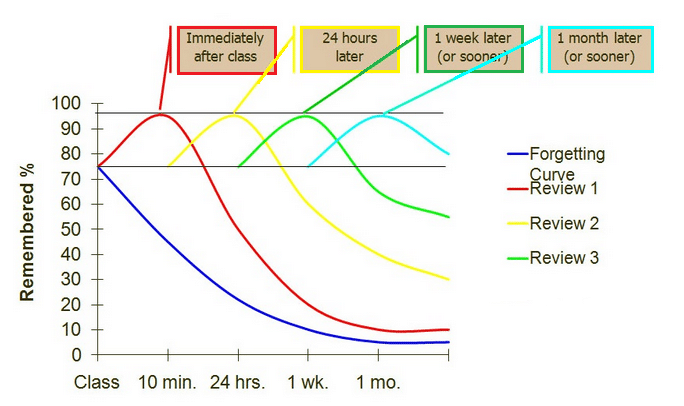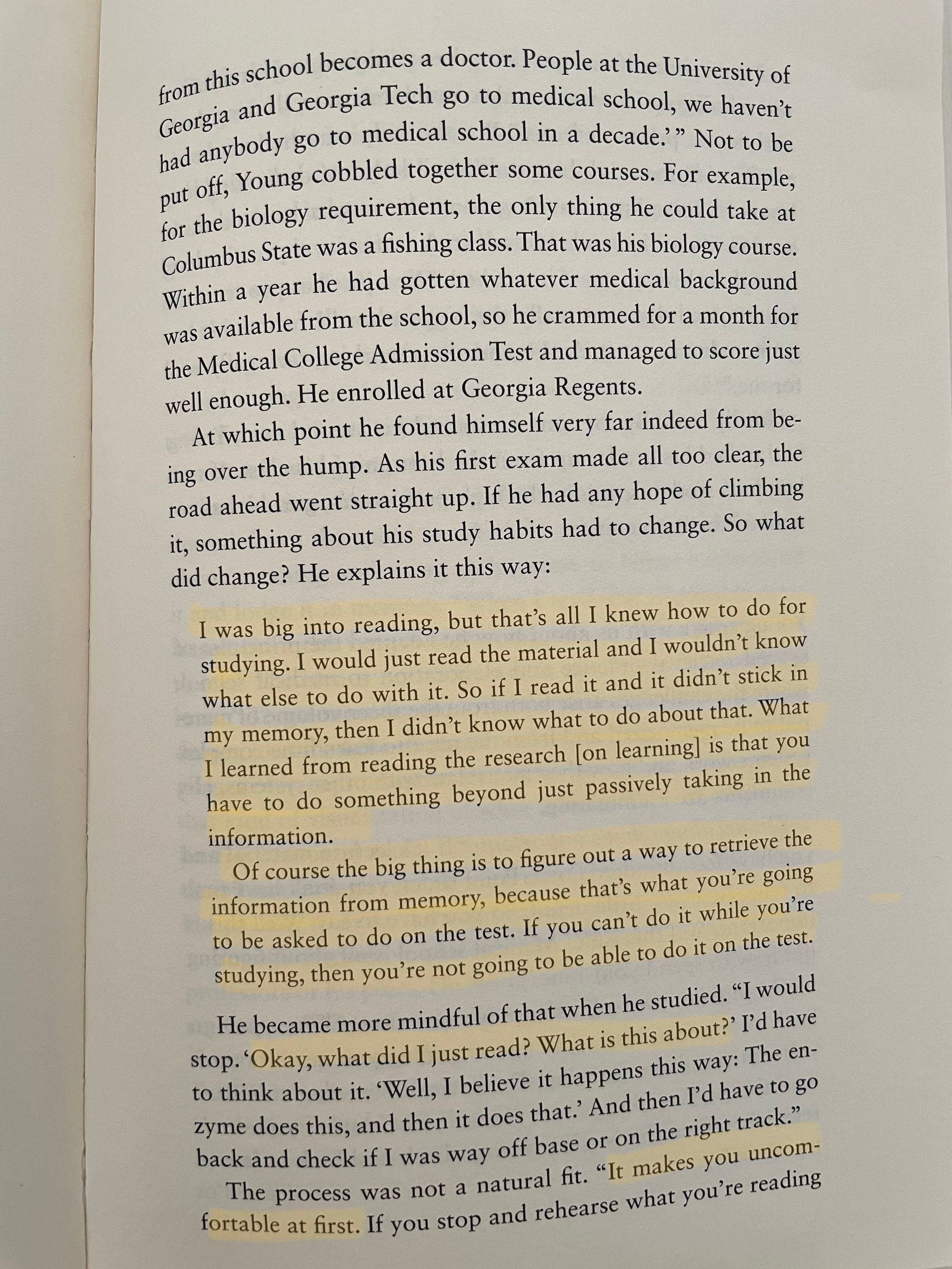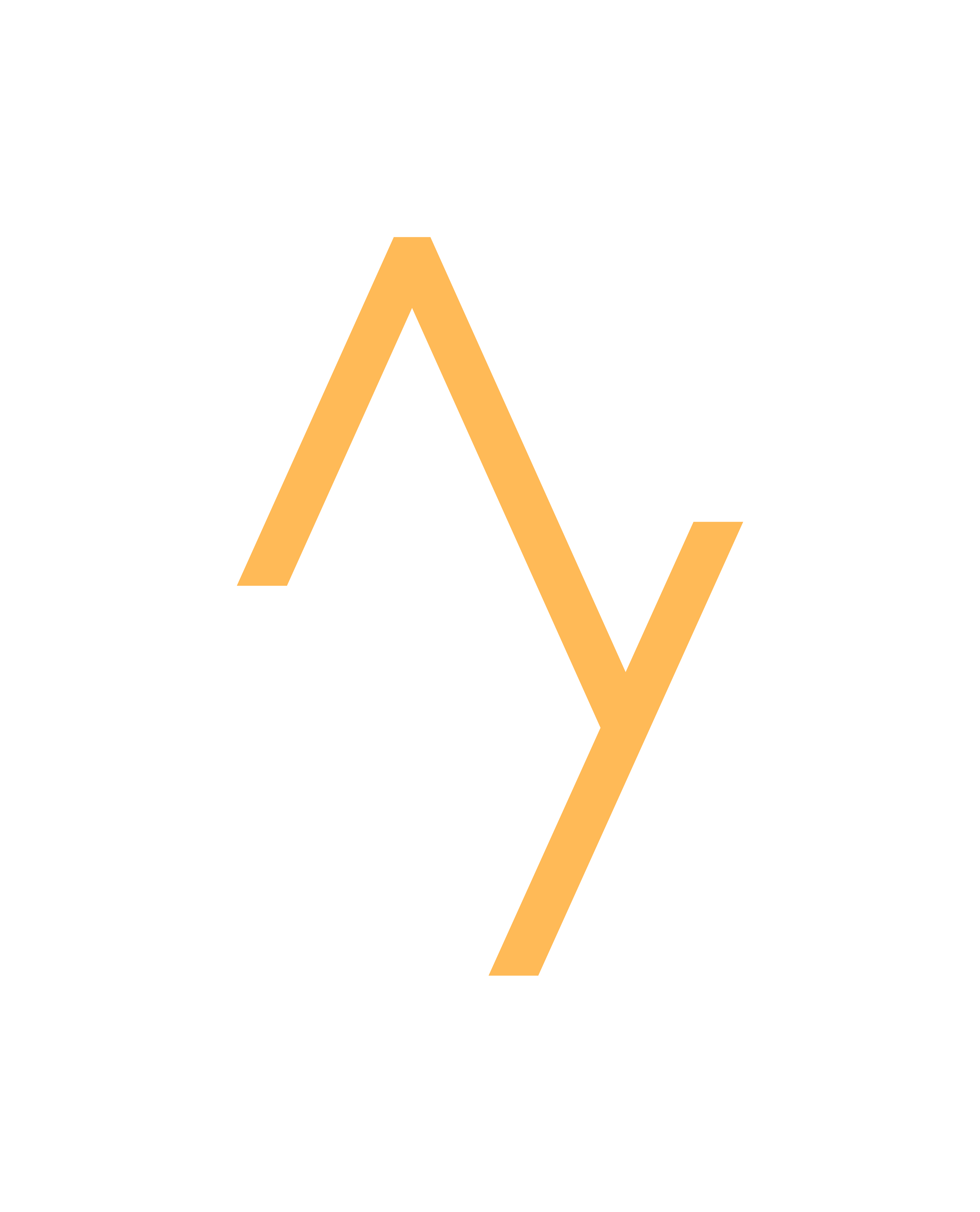How To Learn NEW Content - Using Active Recall
Are you just starting off learning a new subject or topic and have no idea how to be efficient and effective with your learning? We're going to focus on how to learn content you're seeing for the first time quickly and effectively with active recall.
Now in my articles on active recall, spaced repetition and using game design for learning I talked about the importance of using these evidence-based techniques to make you way more efficient and effective when studying for exams. But what if you're seeing the content for the first time? Well jumping straight into creating questions or flashcards might feel overwhelming and breaking out of habits like reading and making notes which you've been taught for years in school can feel tough.
So to help you get started learning new content I'm going to break this post down into sections so that by the end you'll learn about: The difference between memorizing vs actually understanding something, the key to understanding and remembering new content, how I got started using active recall when learning new content and then I'll give you some tips and tricks to help you learn new content as fast as possible.
-4.png)
Memorization Vs Understanding
So spoiler alert the key concepts behind learning new content as quickly and effectively as possible are active recall and spaced repetition.
Now when people are first introduced to concepts like active recall and the idea of self-testing rather than just reading or taking notes they'll watch a video about creating questions and not taking notes and will make some assumptions and then usually fall into one of two groups:
- Either the whole process seems too hard and they are more comfortable passively making notes as this is what they have been taught in school. So they take notes and re-read and highlight ahead of exams. This method might work for them but it just takes way longer and is less efficient and effective but as they are comfortable they just flat out refuse and nope out on using active recall.
- The second way people go is that they go all in and start creating loads of recall questions and flashcards and start immediately testing themselves and then rote-learning and memorising facts. This is a problem as while they are testing themselves they're not necessarily understanding the new content. So if you find yourself making loads of flashcards or questions for every single fact, you need to ask yourself, do I really need a question or a flashcard to remember this and do I actaully understand what I'm learning?
So you don't want to just passively read and you don't want to go to the other extreme and just memorize facts. For people starting out you don't want to fall into either of these two groups and instead you what to focus down on two key things: firstly understanding the topic and where it fits in to what you are studying and secondly you need to then retain and remember that information and apply it. This will not only help you to learn faster and more efficiently but will allow you to apply your knowledge through that understanding and work out answers to questions that you have never seen where someone who has just learned lists of specific facts will be stumped.
The book Make It Stick highlights the two main goals of learning a new skill or concept as:
- Comprehension: You want to gain a deep understanding of the underlying principle in order to understand how it applies to different situations.
- Retention: You need to remember the information when a problem or situation calls for it, and when you get a chance to build upon it with more advanced knowledge.
So understanding plus remembering means good learning means good exam performance means good real-life performance at whatever you're doing. So let's dive in to how to understand new content.
Understanding and Remembering New Content
So we're going to focus on gaining a broad understanding of the new content and the easiest and best strategies to understand something for the first time using active recall as the most effective, evidence-based approach. But first what do we actually mean by understanding something? Well the Miriam Webster dictionary definition that I quite like is:
"the power to make experience intelligible by applying concepts and categories"
This makes understanding synonymous with comprehension or just simply grasping a topic by being able to apply what you have learned compared to memorisation which is about recalling specific facts.
I covered an even easier way to think about understanding in my article on The Feynman Technique where nobel-prize winning physicist Richard Feynman suggests that understanding a concept or topic is demonstrated by your ability to explain it in simple terms as if to a child. So if you can't explain something new that you're learning to a child or to a friend or someone else you don't understand it well enough and you need to dive deeper. To actually do this there is no magic bullet other than putting in the hard work and going through textbooks, videos and learning materials.
Now the key here is to not go through the material passively like the group who noped out on active recall all together but to continuously test yourself and ask yourself questions as you go through new material. You see active recall isn't just about studying for exams by creating questions like in my article that focuses on creating your own questions when studying for an exam; active recall and self testing can be used to learn anything and if there is one thing you take away from this post as someone learning new content is that it's fine to read a text book or watch a video but you need to test yourself as you do, as it's the fastest way to learn new content. Don't just read and re-read or highlight, actually test yourself as soon as you spot something new.
-4.png)
So for example if you are reading through a textbook for the first time rather than making notes, or highlighting things you want to be reading a paragraph and then closing the book and trying to recall the key points in your head or by writing it down and seeing if you can rephrase the concepts in that paragraph in your own words such that anyone you explained it to can understand. If you can't, open the book back up and go again and when you go again you might want to read a little further around the topic you couldn't remember or google any terms which you're unfamiliar with to start to build up that understanding and then test yourself again to see if you can explain the concept. By going back to the textbooks and reading around the topic you are building up structure and context for the topic and how it fits into your current understanding to help you make sense of it.
Medicine and surgery are a great example of this idea of understanding the concepts and principles over rote-learning facts. For example in my surgical exams I could rote-learn that applying something called traction is a way to treat a long-bone fracture. Sure I could memorise it but I don't necessarily know why it's a treatment and I couldn't apply the principles to other questions as I don't know them. If instead I'm going through and thinking "Do I know why traction works?" or "Can i actually explain what traction is in simple terms?" I might then dive into google or a textbook and learn a little bit deeper while still testing and probing my knowledge to build structure and understanding. Even now when talking about it I'm thinking can I explain all the forces around a fracture site and going into really deep concepts around the physics of traction.

If I learn the concept and physics principles behind the treatment; that traction is basically applying weight or a force to straighten out the broken bone against the pull of the muscles which pull on the two broken parts and cause pain, I can apply these principles to lots of other bone fractures and it also helps me when actually treating a fracture in real life or explaining treatment options to a patient.
While you're reading you're staying engaged by testing yourself with active recall and probing your own knowledge actively and searching for answers which helps interleave topics and link them together to build that structure rather than just passive reading.
Once you have tested yourself going through your first initial pass of the new content you then need to ensure that you are remembering it for effective learning. For example you'll naturally forget things due to Ebbinghaus' forgetting curve which is why it's so important that when you learn any new content you add it into a spacing schedule and plan to come back to it to test yourself again and see if you can also remember as well as understanding a topic. This is spaced repetition and I cover this in detail in another post but just as a top level overview the first time you go through and actively engage new content you're focusing on identifying knowledge gaps and making sure that you test yourself that you understand the topic and then you need to come back to it again to make sure that information sticks and if it hasn't stuck you need to go back to your source materials.

How I Changed My Approach To Learning New Content
When I first started experimenting, using active recall rather than reading it felt a bit strange. I already did some self-testing when I read things but completely switching to active reading on the first pass of learning something new felt hard. So for me when I first read the book Make It Stick one of the key takeaways was when they gave examples of students who had changed their grades around from bottom of the class to getting top grades using these techniques. One standout example was a medical student from Georgia Regents University who was overwhelmed by the volume of lecture notes and scored low grades as he just tried to memorise things and read through all the notes. He switched up using some internal active recall questions like "what did I just read?" and "What is this about" and this was a real world example of this working.
Now what really helped me push through was that he also reflects that "the method felt uncomfortable at first as it felt longer stopping and testing rather than just reading through especially if a test was rapidly approaching". But his advice was to "trust the process". This is true of many things that will challenge your usual comfortable way of thinking but may well work out better in the long term.

Karpicke, et al. (2009) believe that students get "illusions of competence" from rereading their notes and textbook which is why people find it so tricky to adopt active recall as they are convinced rereading works despite the evidence. One reason for this illusion is that the text contains all the information, so it is easy to glance over it and feel as if it is known well, when that is not the case at all.
For me testing myself and trying to recall information as I went through on the first pass of learning new content hugely helped my understanding and speed of learning and I incorporated this into how I prepared for lectures and studied for exams as you can see in some of my other videos.
Tips & Tricks to Learn New Content Quickly
Now there are lots of ways to use active recall such as flashcards or closed book or writing down questions and it really doesn't matter what you optimise for, as long as it works for you and is efficient and effective. So for me personally I will read a few paragraphs and mentally test myself and then I will naturally go down a rabbit hole of going to YouTube, Wikipedia, course textbooks and literature papers to get a really solid understanding. To help you get going using active recall quickly to learn new content here are some of my top new content learning hacks.
Plan Things Out
Whatever you're learning get hold of the course syllabus or ask teachers or people who have scored top grades on the exam or course before you to find out what the high yield and most commonly tested topics are. You can also look at simple things like what lectures or classes will be coming up in the next few months so you have a basic top-level overview of how things fit together so that when you first see a new topic you have an understanding of why you are learning it and where it fits in. Having this context will help you to prioritise what you are learning and also help you know where to go to learn more and in what detail you need to learn things. It's crazy how few people do this simple step but it can really help you when you start out.
Pick The Best Tools
Next, make sure you pick the best source materials to learn from. My hack here is to ask the top scoring students from previous years what they used and to then aim to get a short notes book, a longer textbook, a question book or question bank and then have some reliable YouTube channels or website you can refer to.
For medical finals I used a short notes finals revision guide, combined with the Oxford Handbook of Clinical medicine and YouTube searches in addition to lecture notes and slides to help me to quickly fill in knowledge gaps and develop a deep understanding of each topic I was learning. For clinical OSCEs in medicine I'd use actual YouTube videos of clinical exams combined with recommended textbooks from the highest scoring students from the previous years.
Pick Tools That Use Active recall
As you know from my post on How to Study for Exams I'm a big advocate of using existing resources like past-papers and online question banks to save you a huge amount of time and hack your learning. When I as studying for my surgical exams and learning new content I just jumped straight into question books that used active recall questions and which had pre-made explanations like this one and I also used online question banks straight away. As I worked through these I didn't care if I got questions wrong and if I did I would fill in my knowledge gaps and develop a deep understanding by then going back to textbooks, Google and YouTube to make sure I actually understood things if the explanations provided didn't help me. I'd then also do past-papers which are obviously the most realistic example of the types of questions you'll get in the exam. Again speak with people who aced the exam before you and find out what the best resources are or failing that jump into google and see what the best rated pre-made testing materials are for the subject you are learning are it will save you a ton of time. By supplementing high quality question banks and past papers with information from longer textbooks you'll save a ton of time while ensuring you have a deep understanding of a topic.
Challenge Your Beliefs
My final tip is a bit more introspective. Despite all of the evidence we have just spoken about people still find it uncomfortable to go straight into testing themselves. Even people using online question banks might feel that they need to read through a topic before jumping in to questions. So as we've seen you need to trust in the process and test your assumptions. Starting off by simply reading a paragraph of new content and then using active recall to ask in your head "Do I understand this?" is a great first step and you can then build up your active recall and spacing process based on what works best for you whether going straight into question banks like me or creating your own questions or using flashcards; do what works best for you but make sure you apply active recall to understand what you are learning rather than just memorizing facts and then use spacing to test yourself again in a week and a month to ensure you retain your understanding for longer.
-4.png)


